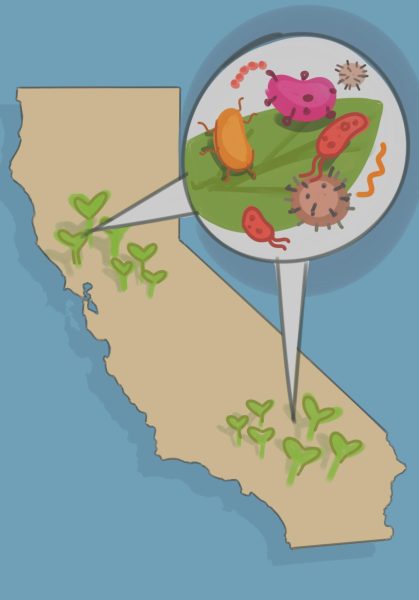
(Emma Li)
In today’s uncertain landscape of public health, foodborne illnesses remain a prominent issue, with outbreaks of salmonella, E. coli and listeria appearing across the nation. These pathogens often arise from produce farms and have led to hospitalizations and fatalities in several states. For California, which supplies much of the nation’s vegetables and fruits, the risk of food contamination and associated illnesses is especially high.
California remains at the heart of the U.S. food supply chain, as the top-ranked agriculture-producing state. Contamination originating in California carries wider consequences, as the state’s significant agricultural exports may trigger national outbreaks of foodborne illness.
“The American food system is actually incredibly good at preventing things like this, given 300 million people [are] eating stuff every day,” biology teacher Michael Pistacchi said. “The flip side of having really good regulations around food is that food is so mass produced in America that one bad batch of vegetables or one bad batch of beef will be mixed in with a vast amount of that product and then shipped out all over the country.”
In recent months, health officials traced an outbreak of E. coli to organic carrots grown and distributed by California farming corporation Grimmway Farms, primarily under its Cal-Organic brand. Cal-Organic grows all carrots in California, which raises concerns about the safety and cleanliness of the state’s agricultural sector. This unease is exacerbated by the national rise in bacterial outbreaks, including a listeria contamination tied to the premium deli-meat brand Boar’s Head.
“A few months back, Boar’s Head had a recall on basically every product they sold because of a listeria outbreak,” sophomore Audrey Hu said. “My mom didn’t know the extent to which the outbreak had occurred or the severity of the disease, and was still planning to buy food from them, until my sister told her that around ten people had already died because of the outbreak.”
While public health officials are still investigating the source of contamination, unsanitary farming practices and animal feces remain common causes of bacterial contamination in farms. Animal manure, especially for cattle, sheep and deer, often carries harmful bacteria like E. coli. When farmers improperly dispose of it, it can contaminate waterways, soil and produce.
Well-known stores like Trader Joe’s and Wegmans unknowingly stocked and sold the infected carrots, and Grimmway Farms voluntarily recalled their affected products, a move that aligns with the latest FDA Class 1 recall update issued on January 1. The recall involved their organic and select baby carrots, which were sold from stores around the world. Consumers who may still have affected produce in their homes must immediately discard these items and sanitize any contaminated surfaces, like freezers or countertops.
Senior Shaila Tandon advised students to purchase food items selectively but emphasized that the media may exaggerate the severity of these illnesses.
“There are always different viruses and recalled items in the market, so you just have to be careful and proactive,” Shaila said. “At the same time, don’t let it scare you and you shouldn’t drastically change what you buy or eat at all. Often, the people that are actually affected by these foodborne illnesses represent a much smaller percentage of the population than the media makes it seem, so be smart while reading the news.”
FDA oversight plays a significant role in public food safety, which may change with the upcoming presidential transition. US Secretary of Health and Human Services nominee Robert F. Kennedy Jr. has proposed major FDA reforms while promoting unsubstantiated health claims, like the link between vaccines and autism and the nutritional advantages of drinking raw milk.
“Nominees that we’re seeing in charge of the FDA and the medical system have historically espoused support of things that are not good for public health,” Pistacchi said. “Kennedy is very pro-raw milk, and although raw milk may be able to be done well on a mass scale, it is probably the most dangerous food item that can be consumed in terms of the bacteria that can be spread. We don’t know what these folks are going to do.”


















![“[Building nerf blasters] became this outlet of creativity for me that hasn't been matched by anything else. The process [of] making a build complete to your desire is such a painstakingly difficult process, but I've had to learn from [the skills needed from] soldering to proper painting. There's so many different options for everything, if you think about it, it exists. The best part is [that] if it doesn't exist, you can build it yourself," Ishaan Parate said.](https://harkeraquila.com/wp-content/uploads/2022/08/DSC_8149-900x604.jpg)




![“When I came into high school, I was ready to be a follower. But DECA was a game changer for me. It helped me overcome my fear of public speaking, and it's played such a major role in who I've become today. To be able to successfully lead a chapter of 150 students, an officer team and be one of the upperclassmen I once really admired is something I'm [really] proud of,” Anvitha Tummala ('21) said.](https://harkeraquila.com/wp-content/uploads/2021/07/Screen-Shot-2021-07-25-at-9.50.05-AM-900x594.png)







![“I think getting up in the morning and having a sense of purpose [is exciting]. I think without a certain amount of drive, life is kind of obsolete and mundane, and I think having that every single day is what makes each day unique and kind of makes life exciting,” Neymika Jain (12) said.](https://harkeraquila.com/wp-content/uploads/2017/06/Screen-Shot-2017-06-03-at-4.54.16-PM.png)








![“My slogan is ‘slow feet, don’t eat, and I’m hungry.’ You need to run fast to get where you are–you aren't going to get those championships if you aren't fast,” Angel Cervantes (12) said. “I want to do well in school on my tests and in track and win championships for my team. I live by that, [and] I can do that anywhere: in the classroom or on the field.”](https://harkeraquila.com/wp-content/uploads/2018/06/DSC5146-900x601.jpg)
![“[Volleyball has] taught me how to fall correctly, and another thing it taught is that you don’t have to be the best at something to be good at it. If you just hit the ball in a smart way, then it still scores points and you’re good at it. You could be a background player and still make a much bigger impact on the team than you would think,” Anya Gert (’20) said.](https://harkeraquila.com/wp-content/uploads/2020/06/AnnaGert_JinTuan_HoHPhotoEdited-600x900.jpeg)

![“I'm not nearly there yet, but [my confidence has] definitely been getting better since I was pretty shy and timid coming into Harker my freshman year. I know that there's a lot of people that are really confident in what they do, and I really admire them. Everyone's so driven and that has really pushed me to kind of try to find my own place in high school and be more confident,” Alyssa Huang (’20) said.](https://harkeraquila.com/wp-content/uploads/2020/06/AlyssaHuang_EmilyChen_HoHPhoto-900x749.jpeg)





